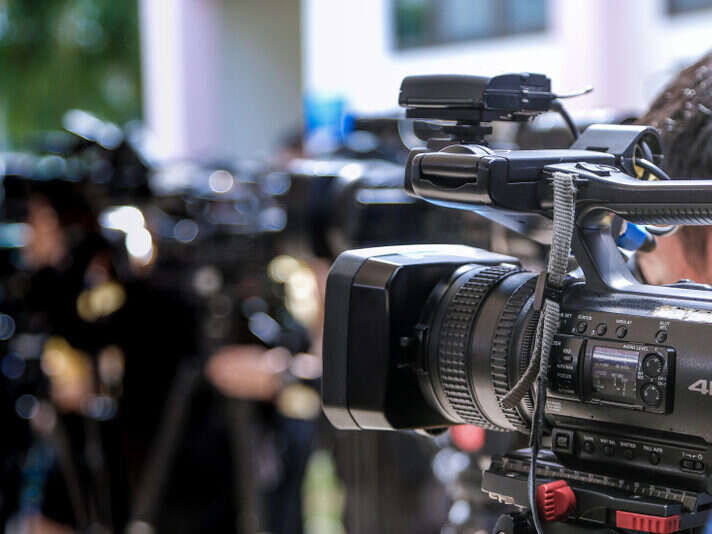
When telling the truth is under constant threat; when new generations are not interested in mainstream news sources; when AI could take all our jobs or revolutionise our industry – or both; where are the frontlines of news and how do we report from them?
The News Xchange website will provide ongoing coverage of the annual two-day News Xchange event, which this year takes place in Dublin between 18-19 June.
The theme for this year’s conference is “The Frontlines Of News”, and this is also the topic we will tackle on NewsXchange.org during 2023, extending and examining the themes of the sessions we’ll programme in Ireland this month. (Scroll down for an exclusive 50% Press Gazette discount code for delegate passes.)
There are so many frontlines: from war and the climate emergency to the fight to improve diversity and inclusion across every part of society, to recognising the challenge of fluidity of gender, the ongoing battle at the frontline of politics and so much more.
All of this is set against a background of increased tension and anxiety in a world that increasingly relies on the news business to report on and distil the complex issues across every frontline. Never has the challenge been so great and the stakes so high.
The pandemic made the news personal for everyone on the planet, for the same reason at the same time.
Then war, on the ground and cyberspace, drew battle lines between truth and lies, good and evil – but where exactly those lines are is the subject of global disagreement, disinformation and misinterpretation.
Making sense of this is the challenge we all face. It’s the challenge News Xchange 2023 will confront, and the challenge we will rise to week-by-week online.
In the coming months, through articles here and sessions in person in Dublin, leading journalists, news executives and thought leaders will offer their views on the challenges of reporting the many frontlines news is tasked to cover.
The first of those are published this week on NewsXchange.org.
On the battle against disinformation, Phil Chetwynd, global news director of Agence France-Presse, considers the environment into which his reporters file: “When our journalists report now, we know there will be people looking to undermine and manipulate our work. The pressure to get it 100% right has never been higher because we know that any slip or error, no matter how innocent, will be ruthlessly exploited. The stakes are raised because the counter-attack is often looming in the mind of the journalist as they report the story.”
Ukraine will feature prominently in our coverage: the ground war, the information war – and journalist safety and mental health in the midst of continuing conflict.
Mika Mäkeläinen, on the frontline in Ukraine for Finland’s YLE, considers the challenges of the most dangerous of frontlines, and some of the issues they have to cope with on a daily basis.
As a Finnish journalist, reporting from Ukraine has been very personal for Mäkeläinen. “When I meet Ukrainian refugees, I think of my grandparents fleeing from Soviet Union’s invasion during WW2. When I walk through destroyed villages in Ukraine, I think of the homestead and village in Karelia where my family roots go back centuries. It too was occupied and its people forced to evacuate,” he says.
We also consider the many new different ways that war is being covered. Veteran investigative reporter John Sweeney is funding his reporting from Ukraine via subscribers on Patreon – it’s a risky business. In his report he says: “On Day Two of Russia’s big war I was arrested by a Ukrainian soldier in Kyiv on suspicion of being a Russian spy. ‘Do I look like a Russian spy?’ I yelled. Never argue with a Ukrainian with a loaded machine gun. I was carted off to the HQ of Ukrainian intelligence, investigated, freed and that evening back in my flat I made a two-minute film for Twitter declaring, long before it was fashionable, that Vladimir Putin was in trouble.”
We will also interrogate the Russian perspective, with the BBC’s Moscow correspondent Steve Rosenberg and Marina Ovsyannikova, whose one-woman protest, putting up a placard in the middle of the live nightly national news in Russia, meant she had to flee with the help of RSF.
If Ukraine dominates the European agenda, does that mean that journalists are paying too little attention to Afghanistan, the Middle East and Myanmar, as well as the potential for conflict between China and Taiwan?
On Myanmar Masaru Zenke, a producer for NHK, writes: “In the face of the devastation of their homeland, Myanmar residents in Japan, who have been continuously trying to get the real voices from their homeland, have a growing sense of fear, saying: ‘The most frightening thing is that the world will forget about it.’ A heart-breaking cry that their motherland is in such a critical state and the world’s interest is waning.”
And what of the view in and from the US? News Xchange debates the global perspective. There’s no one angle – as Branka Slavika, Washington Correspondent for HRT, Croatia writes: “Chinese spy balloons. Clouds of recession. A permanent immigration crisis on the US-Mexican border. Reparation for slavery. Gun violence. Elon Musk’s Twitter drama. Chris Rock vs. Will Smith. Social trends which mostly started in the US and then spread around the world. Which topics and phenomena are the most interesting for a Croatian Television viewer? What should I focus on to be on a news frontline?”
We’ll also address climate – the frontline that had all the attention 18 months ago. How should it be covered now, and, practically, what moves toward sustainability are possible for news teams to implement? We will explore the work of a BBC team leading the way to create a gold standard for how these issues are covered and best practice is implemented by news organisations.
And what of the digital frontline? Is ChatGPT actually writing this article? Attention has been on AI as a threat, but can it be harnessed by to tell better stories based on more accurate data?
Patrick Weinhold, head of social media at ARD’s Tagesschau in Germany writes on how they are competing with – and joining – Tiktok to reach Gen Z and beyond: “On Tiktok we aim at a direct dialogue with our subscribers in the comment sections and live streams, we answer questions and show how we gather information. When it comes to disinformation we act as fact checkers – our users often draw our attention to false news spreading on the platform.”
And we are delighted to be in Dublin for the first “in person” News Xchange since the pandemic.
RTE Europe Editor Tony Connelly considers how Brexit has been so dominant: “It is startling to realise that, for the EU and UK, the great geopolitical challenges of our time – Russia’s invasion of Ukraine, China, climate change, energy – have all been hobbled and held up by a dispute over a patch of territory on Europe’s far western seaboard and what, for example, animal health rules might apply there”.
Never has there been a more important time to debate these topics and develop strategies to address them.
Press Gazette readers have access to a dedicated discount of 50% on delegate passes at News Xchange by entering the code PG202350 into the event ticket page here.
Email pged@pressgazette.co.uk to point out mistakes, provide story tips or send in a letter for publication on our "Letters Page" blog




